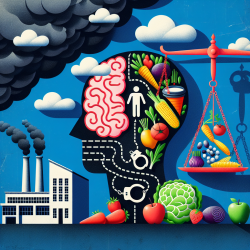In recent years, there has been a growing body of research exploring the relationship between nutrition, particularly the consumption of ultra-processed foods, and various aspects of mental health and behavior. This emerging field, sometimes referred to as "nutritional criminology," highlights the potential implications for practitioners working within the criminal justice system. The research suggests that dietary components may play a more significant role in influencing behavior than previously appreciated.
Understanding Ultra-Processed Foods
Ultra-processed foods are typically high in refined sugars, industrial fats, sodium, and synthetic additives. These foods are often calorie-dense but low in essential nutrients and fiber. The widespread consumption of such foods has been linked to numerous health issues, including obesity, cardiovascular diseases, and type II diabetes. However, less attention has been paid to their potential impact on mental health and behavior.
The Link Between Diet and Behavior
Research indicates that ultra-processed food consumption may be associated with poor mental health outcomes such as depression and anxiety. Additionally, there is evidence suggesting a link between these foods and antisocial or aggressive behavior. The mechanisms behind these associations may involve changes in the gut microbiome and systemic inflammation, both of which can affect brain function.
Nutritional Interventions in Criminal Justice Settings
Historical studies have explored the impact of dietary changes on behavior within correctional facilities. For instance, replacing highly processed foods with healthier options has been associated with reductions in antisocial behavior among juveniles. More recent research supports these findings, suggesting that dietary interventions could be a valuable tool for practitioners aiming to reduce recidivism and improve outcomes for individuals within the criminal justice system.
The Role of the Microbiome
The gut microbiome plays a crucial role in overall health, influencing everything from digestion to immune function. Emerging research suggests that the microbiome may also affect mood and behavior. Diets high in ultra-processed foods can negatively alter the gut microbiota, potentially leading to increased aggression or other behavioral issues. This highlights the importance of considering dietary patterns when addressing behavioral concerns.
Encouraging Further Research
While current evidence points to a significant relationship between diet and behavior, further research is needed to fully understand these connections and their implications for practice. Practitioners are encouraged to stay informed about developments in nutritional science and consider how dietary interventions might complement existing strategies within their work.
To read the original research paper that delves deeper into these findings, please follow this link: Nutritional Criminology: Why the Emerging Research on Ultra-Processed Food Matters to Health and Justice.










